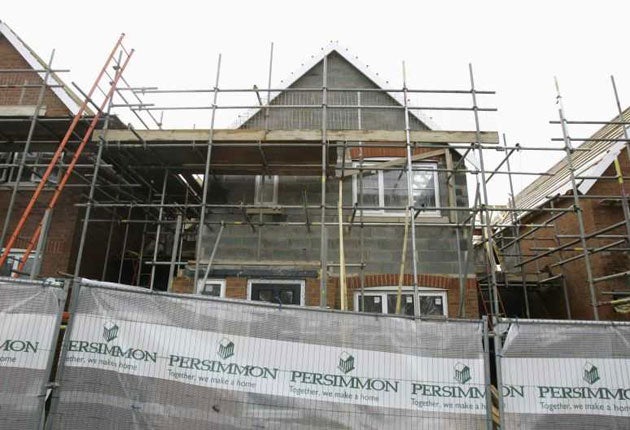Britain's biggest housebuilder is giving £600m in bonuses to bosses - and you helped pay for it
The biggest winner is chief executive Jeff Fairburn, who could pocket more than £100m. And the biggest loser is you, me and every other British taxpayer, because we've helped stump up for these grotesque pay days


Your support helps us to tell the story
From reproductive rights to climate change to Big Tech, The Independent is on the ground when the story is developing. Whether it's investigating the financials of Elon Musk's pro-Trump PAC or producing our latest documentary, 'The A Word', which shines a light on the American women fighting for reproductive rights, we know how important it is to parse out the facts from the messaging.
At such a critical moment in US history, we need reporters on the ground. Your donation allows us to keep sending journalists to speak to both sides of the story.
The Independent is trusted by Americans across the entire political spectrum. And unlike many other quality news outlets, we choose not to lock Americans out of our reporting and analysis with paywalls. We believe quality journalism should be available to everyone, paid for by those who can afford it.
Your support makes all the difference.Even by the porcine standards of City excess, the handouts being slung across the boardroom at Britain’s biggest housebuilder, Persimmon, are enough to churn the stomach. If, as is expected, the company hands out £600m in “incentive payments” – that’s a big fat bonus to you and me – to its top 150 managers during the next five years, it will be the largest ever payment made at a FTSE 100 company outside banking.
The biggest winner is Persimmon chief executive Jeff Fairburn, who could pocket more than £100m. And the biggest loser is you, me and every other British taxpayer, because we've helped stump up for these grotesque pay days.
If Persimmon had any concern about its public reputation, it might have thought twice about making such excessive and unnecessary payments at a time when Britain is facing a housing crisis which housebuilders have singularly failed to help solve.
As a PR move, it’s poor judgement to hand out as a freebie the cost of 1,500 of its luxury family homes while so many families are squeezed into properties that are too small, or stuck in rented accommodation because so few new homes are being built, or are being built so slowly – especially at a time when politicians are discussing a “use it or lose it” clause to wrench undeveloped land off housebuilders to stop them sitting on it for their own benefit.
Even worse, to do that knowing that those profits are driven and, at least in part, paid for by taxpayers through the Help to Buy scheme. So much for an incentive to work hard; this is a bonus for being in the right place at the right time.
In the wake of the 2008 financial crisis, two things happened: house prices momentarily dipped, and mortgages became more difficult to secure as tough restrictions were placed on lending. Demand for housing (that is in capital terms, the number of buyers in the market at the time, not the demand out there for high-quality, affordably priced housing to both rent and buy – which, of course, continues to soar) dried up. Those who would be looking to upgrade to a bigger home hesitated and would-be first-time buyers rode out a precarious job market while being asked to raise impossible sums as a deposit to secure a mortgage.
Did the government have to intervene in housing? And in doing so, did it do the right thing? The money plunged into Help to Buy might have been better spent on new social housing or creating an investors’ market in high-standard rented accommodation. But that’s a moot point now, for the money went into stimulating house-building by offering equity loans and mortgage guarantees for buyers of newbuild properties.
In response, the builders built. House prices went up again, demand for housing rose, and so did the profits pocketed by developers. Persimmon sold 3,000 homes under Help to Buy in the first year of the scheme. A statement released by the company in late 2013 said: “We are fully sold up for the current year and have £650m forward sales reserved beyond 2013 – a 41 per cent increase on the comparable prior year position.”
Right place, right time. Taxpayer-funded investment in the housing market stimulated demand and now, thanks to your help, property bosses are sitting pretty on a record bonus deal.
Meanwhile, Help to Buy has had other curious effects. Some estate agents, particularly in areas where demand for housing is rising fast, such as the east of England, say the scheme has artificially inflated house prices further – pushing those property profits ever higher, while making it increasingly difficult for the average earner to ever get a toehold on that great British property ladder. Rents are still rising – the average cost of a new tenancy on a one-bedroom home hit £746 a month in May, according to Countrywide; that’s almost half the take-home pay of an average young person – and there are more than 52,000 homeless households in England.
This isn’t just a story about executive pay, but about the relationship between work and payment. How much is enough? Sure, the targets that top team members were set to achieve these staggering bonuses were high. Very high. But when the market is rigged in favour of growth, which of these individuals could really claim that bonus had been earned? More to the point, being a taxpayer, couldn’t I claim that, through my investment, I have earned a portion of that pie? And couldn’t you too?
Join our commenting forum
Join thought-provoking conversations, follow other Independent readers and see their replies
Comments